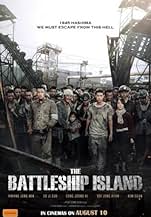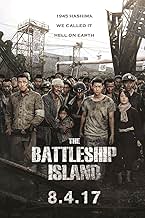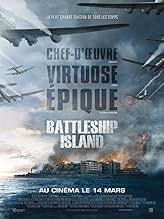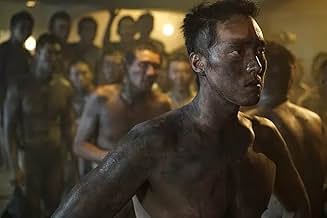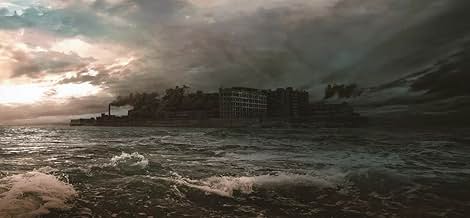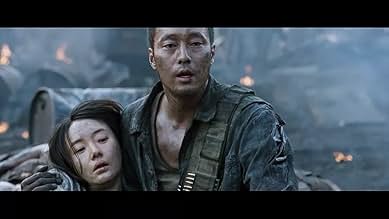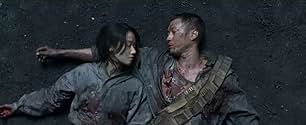AVALIAÇÃO DA IMDb
7,1/10
9,1 mil
SUA AVALIAÇÃO
Durante a era colonial japonesa, cerca de 400 coreanos, que foram forçados a ir para a ilha de Hashima para extrair carvão, tentaram uma fuga dramática.Durante a era colonial japonesa, cerca de 400 coreanos, que foram forçados a ir para a ilha de Hashima para extrair carvão, tentaram uma fuga dramática.Durante a era colonial japonesa, cerca de 400 coreanos, que foram forçados a ir para a ilha de Hashima para extrair carvão, tentaram uma fuga dramática.
- Prêmios
- 11 vitórias e 9 indicações no total
Jon Allen
- Song Jong-Gu
- (English version)
- (narração)
Tommy Arciniega
- Oh Jang-Woo
- (English version)
- (narração)
- (as a different name)
Greg Chun
- Lee Gang-ok
- (English version)
- (narração)
Na Do-yool
- Joseon draftee
- (as Na Do-yul)
Avaliações em destaque
Profound for the simple reason that this film breathes life into history by presenting this extraordinarily gripping true story. Absolutely stunning. One amazingly kinetic experience, splendid production values and some of the most intense staging and action you'll see within the korean film industry.
Emotionally gripping for me to watch this because I tend to be overwhelmed by what happened to the characters in war-plot movie. The casts were all great and wonderful in their roles, each bringing out one another's best aspects and molded their chemistry throughout the journey in this movie. There were various themes on humanity being touched and carried on as the key to this movie while you are brought into an existential reflection of what if you are part of it in that war-era period, what would you have done to stay alive and what would you have chose to do. Watch this movie without getting too hung up on the political facts but more on being in the shoes of those who had to plough their way for survival. I also like the cinematography of the scenes when everyone trying to escape and working together towards it although I must say the ways certain gun shots shown just a bit hard to comprehend how certain people so easily died while certain just survived.
As an Indian guy, I never really knew about the Japanese invasion of Korean peninsula and their atrocities towards Korean people. This movie gives an insight into it. I think Germany and Japan became allies because both think they're the most purest and superior bloods among their neighbours. The Japanese red light district is something that I think no other colonial power has implemented in their colonies. If I'm wrong please forgive me. After watching this movie the one thing I did wish was, if that THUG GUY and STRONG LADY could live together. Everyone who worked in front of the camera and behind it did a really good job. Thanks very much for this movie.
A Japanese island, 9 miles from Nagasaki, enlarged & used from 1897 to 1974 to mine coal w/shafts going down 2/3 of a mile beneath the sea. Oddly, given the Pacific rim geologic history of subduction, that there's massive sedimentary (typically surface heavily vegetated wetlands) deposits of coal forming there. It's common name is Gunkanjima, meaning battle ship. The actual name is Hashima Island. From the '30s to the end of WWII Chinese & Korean conscripts/prisoners numbering in the thousands worked those mine shafts w/80+ temps & 95% humidity & some might say brutal treatment. During that time period an estimated 1300 miners died.
The movie mixes factual & fictionalized events. Kudos goes to the production of one of the best movie sets/props I've ever seen (actually built in Chuncheon, Korea) - Game of Thrones level. Also to the costuming & makeup personnel for the grimy authenticity & cinematography for the great camera work. Acting was spot-on although as is typical in these types of films the baddies (the Japanese in this case) are made to be really bad dudes. Forewarned - lots of violence, especially towards the end.
The movie mixes factual & fictionalized events. Kudos goes to the production of one of the best movie sets/props I've ever seen (actually built in Chuncheon, Korea) - Game of Thrones level. Also to the costuming & makeup personnel for the grimy authenticity & cinematography for the great camera work. Acting was spot-on although as is typical in these types of films the baddies (the Japanese in this case) are made to be really bad dudes. Forewarned - lots of violence, especially towards the end.
From all the Asian countries Korea has the best movies. I don't know why that is, but it's just a fact. I saw enough Asian movies by now to come to that conclusion. Gun-Ham-Do is certainly not the best Korean movie I ever watched but it's well made and worth a watch. As usual it's very loud verbally, like almost all Asian movies. I don't know why but they seem angry all the time when they talk. In this movie they could be though as it is a war movie about Hashima Island, more a concentration camp than a work environment if you ask me. There are some really good battle scenes, especially at the end. It clearly shows they put some effort in this movie. I wouldn't say all the actors are great actors, because for that some extras looked too fake in their expressions, and that's the case for most Asian movies. It seems they like to exaggerate a bit. And for that I score this movie lower. The story is interesting though, with good visual effects. If you like Korean movies give this one a shot.
Você sabia?
- CuriosidadesCharacters in the film at several points mention "the company" they work for, but which is never named. In reality, this company was the Mitsubishi Corporation, which owned Hashima Island until 2002.
- Erros de gravação00:16:13 - 00:16:50 -> The band members are supposed to cross from Korea to Japan in the dirty, packed hold of a cargo ship. When they emerge from the boat in Shimonoseki, one can see it is a very modern ferry, complete with fully-enclosed, bright orange modern lifeboats, streamlined design, and all-welded hull and superstructure construction, as opposed to ships of the period, which were riveted.
- Citações
Lee Gang-ok: I'm not going to die. Why are you crying?
- Cenas durante ou pós-créditosThe title card is shown first in Japanese and then in Korean.
- Versões alternativasThe director's cut of the film is 150 minutes long in duration while the original theatrical version is about 132 minutes long.
- Trilhas sonorasThe Ecstasy of Gold
Composed by Ennio Morricone
Principais escolhas
Faça login para avaliar e ver a lista de recomendações personalizadas
- How long is The Battleship Island?Fornecido pela Alexa
Detalhes
- Data de lançamento
- País de origem
- Centrais de atendimento oficiais
- Idiomas
- Também conhecido como
- The Battleship Island
- Locações de filme
- Empresa de produção
- Consulte mais créditos da empresa na IMDbPro
Bilheteria
- Faturamento bruto nos EUA e Canadá
- US$ 1.104.957
- Fim de semana de estreia nos EUA e Canadá
- US$ 59.344
- 30 de jul. de 2017
- Faturamento bruto mundial
- US$ 46.183.383
- Tempo de duração
- 2 h 12 min(132 min)
- Cor
- Mixagem de som
- Proporção
- 2.35 : 1
Contribua para esta página
Sugerir uma alteração ou adicionar conteúdo ausente


